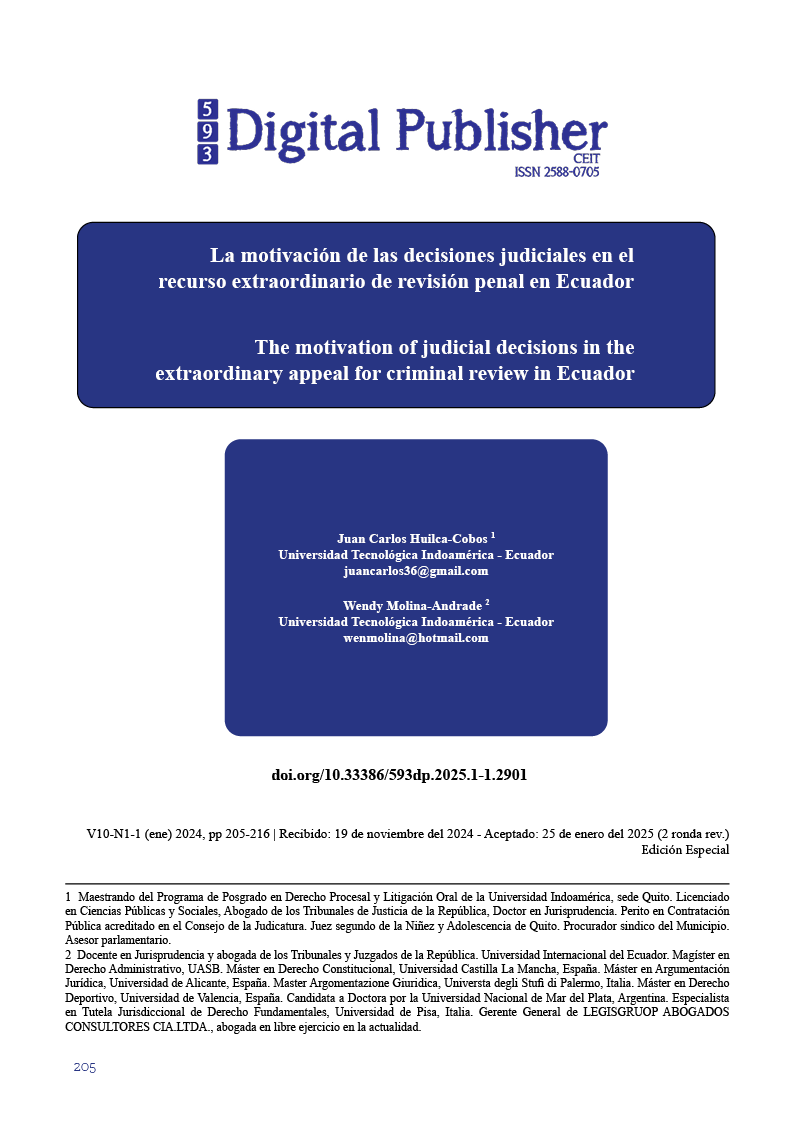The motivation of judicial decisions in the extraordinary appeal for criminal review in Ecuador.
Main Article Content
Abstract
The extraordinary appeal for review in criminal matters is consolidated as a mechanism that allows the review of sentences that are final, its purpose is to correct the errors produced and, in this way, guarantee the efficient application of due process, legal certainty and effective judicial protection. The main objective of this investigation is to analyze the impact of the guarantee of motivation in judicial decisions regarding the appeal for review in criminal matters, in order to demonstrate whether there is an exhaustive analysis of the facts and the law, taking into consideration The Ecuadorian legal system requires that all judicial or administrative decisions, no matter how minimal they may be, must be duly substantiated and the reasons and legal principles that motivate their decision must be explained. For this reason, a literary review of the legal regulations and doctrine is carried out through the application of the qualitative approach and the documentary analysis technique, thus managing to collect important data related to the topic analyzed. It is concluded that the guarantee of motivation is one of the essential requirements that guarantees that the resolution of the review appeal is carried out in accordance with the law and thus guarantees the legitimacy of the judicial system.
Keywords: Due process, Challenge, Motivation, Criminal, Appeal for review.
Downloads
Article Details

This work is licensed under a Creative Commons Attribution-NonCommercial-ShareAlike 4.0 International License.
1. Derechos de autor
Las obras que se publican en 593 Digital Publisher CEIT están sujetas a los siguientes términos:
1.1. 593 Digital Publisher CEIT, conserva los derechos patrimoniales (copyright) de las obras publicadas, favorece y permite la reutilización de las mismas bajo la licencia Licencia Creative Commons 4.0 de Reconocimiento-NoComercial-CompartirIgual 4.0, por lo cual se pueden copiar, usar, difundir, transmitir y exponer públicamente, siempre que:
1.1.a. Se cite la autoría y fuente original de su publicación (revista, editorial, URL).
1.1.b. No se usen para fines comerciales u onerosos.
1.1.c. Se mencione la existencia y especificaciones de esta licencia de uso.
References
Bustamante, A., & Molina, V. (2023). La garantía de motivación desde la línea jurisprudencial de la Corte Constitucional Ecuatoriana. Revista Metropolitana de Ciencias Aplicadas, 6(1), 90-99. Obtenido de https://remca.umet.edu.ec/index.php/R EMCA/article/view/603/609
Caicedo, M. (2023). Análisis y comentarios de la Sentencia dictada en el Proceso Penal Nº- 02281-2016-00074. Revista Debate Jurídico Ecuador. Revista Digital de Ciencias Jurídicas.UNIANDES, 6(3), 317-32. Obtenido de https://revista.uniandes.edu.ec/ojs/inde x.php/DJE/article/view/3233/3764
Castro, E. (2023). El contenido esencial del derecho al debido proceso. Un análisis para su correcta comprensión. Métodos Revista Electrónica de Investigación Aplicada en Derechos Humanos de la cdhcm(24), 67-91. Obtenido de https://revista- metodhos.cdhcm.org.mx/index.php/me todhos/article/view/178/2023_24_met odhos_articulo_3.pdf
Código Orgánico Integral Pena. (10 de febrero de 2014). Registro Oficial Suplemento 180. Obtenido de https://www.defensa.gob.ec/wp- content/uploads/downloads/2021/03/C OIP_act_feb-2021.pdf
Contreras, F. (2022). El derecho al debido proceso a partir de la Sentencia Constitucional 4-19-ep/21. Revista Metropolitana de Ciencias Aplicadas, 5(1), 148-158. Obtenido de https://remca.umet.edu.ec/index.php/R EMCA/article/view/480/495
Corte Constitucional del Ecuador. (21 de junio de 2012). SENTENCIA N.° 227-12-
SEP-CC. Quito, Ecuador. Obtenido de http://doc.corteconstitucional.gob.ec:8 080/alfresco/d/d/workspace/SpacesStor e/e8151460-60c1-4032-ba6d-84f25cd9c0eb/1212-11-ep- sentencia.pdf?guest=true
Corte Constitucional del Ecuador. (20 de octubre de 2021). Sentencia No. 1158- 17-EP/21. Quito, Ecuador. Obtenido de http://esacc.corteconstitucional.gob.ec/ storage/api/v1/10_DWL_FL/e2NhcnBld GE6J3RyYW1pdGUnLCB1dWlkOidkYjI2N zM0NS05MjE2LTQ1ZDMtOGE5Ny03YTg2ZTAyMmYwYmYucGRmJ30=?fbclid=Iw AR1ArJVS3zV7Q-WA4PsQ_BzRVA6wx9DEbmPHuxiWGijv VGH6nodJ3dit9hk
Corte Constitucional del Ecuador. (9 de febreo de 2023). Sentencia No. 997-19- EP/23. Quito, Ecuador. Obtenido de http://esacc.corteconstitucional.gob.ec/ storage/api/v1/10_DWL_FL/e2NhcnBld GE6J3RyYW1pdGUnLCB1dWlkOicwMDlj ZDhkOC1iNDRmLTQ3NzQtOGFmNS03Z
GVjMmI4YzQyZGMucGRmJ30=
Guillén, B., & Argüello, D. (2024). LA PRUEBA NUEVA EN EL RECURSO DE
REVISIÓN. Revista Debate Jurídico Ecuador. Revista Digital de Ciencias Jurídicas. UNIANDES, 7(1), 118-130.
Obtenido de https://revista.uniandes.edu.ec/ojs/inde x.php/DJE/article/view/3353/3873
Hernández, V. (2018). El test de motivación de la Corte Constitucional del Ecuador: ¿Cómo conocer si una sentencia está correctamente fundamentada? YACHANA Revista
Científica, 7(1), 21-31. Obtenido de http://repositorio.ulvr.edu.ec/bitstream
/44000/3659/1/El%20test%20de%20m otivaci%c3%b3n%20de%20la%20Corte
%20Constitucional%20del%20Ecuador.
%20%c2%bfC%c3%b3mo%20conocer% 20si%20una%20sentencia%20est%c3%a 1%20correctamente%20fundamentada. pdf
Mora, A., & Rojas, F. (2023). El cambio de precedente en la garantía de la motivación en el Ecuador. ESTUDIOS CONSTITUCIONALES, 21(2), 90-116.
Obtenido de https://www.scielo.cl/pdf/estconst/v21 n2/0718-5200-estconst-21-02-90.pdf
Paredes, W., Samaniego, D., Diaz, I., & Soxo, J. (2022). La motivación como una garantía del debido proceso en el sistema de aplicación de justicia ecuatoriana. Revista Universidad y Sociedad, 14(S4), 674-681. Obtenido de https://rus.ucf.edu.cu/index.php/rus/art icle/view/3181/3122
Proaño, D., Coka, D., & Chugá, R. (2021). Los recursos penales de impugnación en Ecuador. Revista Dilemas Contemporáneos: Educación, Política y Valores(77), 1-15. Obtenido de https://www.scielo.org.mx/pdf/dilemas/ v9nspe1/2007-7890-dilemas-9-spe1- 00077.pdf
Valenzuela, G. (2020). Enfoque actual de la motivación de las sentencias. Su análisis como componente del debido proceso. Revista de Derecho(21), 72-90. Obtenido de
http://www.scielo.edu.uy/pdf/rd/n21/2 393-6193-rd-21-72.pdf
Zambrano, A. (2010). Debido proceso y extradición. Iuris Dictio, 2(3), 25-32. Obtenido de https://revistas.usfq.edu.ec/index.php/i urisdictio/article/view/541



